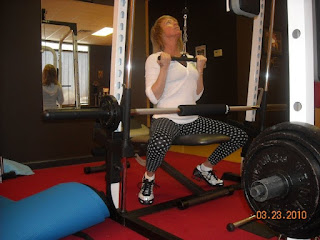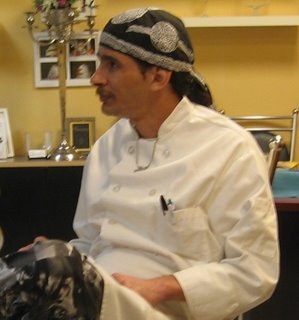Glycogen and Fitness
When considering a fitness program, for some, it is very important to understand how gluclose affects and supplies our bodies with necessary fuels for us to recieve the maximum benefits from our dieting and fitness programs.
To be physically fit you need to develop enough flexibililty and muscle strength along with muscle and cardio-respiratory endurance to allow us to meet the demands of life with energy left to spare. This energy (fuels) that support physical activity are derived from glucose (from carbohydrates), fats (from fatty acids) and in a limited capacity, amino acids from proteins. While resting, our bodies depend on fatty acids to provide us with over half of the energy it needs.
Glucose is stored in our liver and kidneys as glycogen. Our glycogen supplies are limited which is why the fatty acids are vitally important. Our muscles can only store up to 2000 kcalories as glycogen while fat can contain up to 70,000 kcalories of energy, so when our physical activity is strenuous, especially for endurance athletes, the glycogen stores can get depleted rather rapidly, and once depleted our bodies depend on the fat and fatty acids to provide our muscles with the necessary glucose it needs.
The rate at which glycogen stores are used depends on two things: the duration of the exercise and the intensity of the exercise. As a general rule, people that work out for more than 45 minutes should pay attention to the amount of glycogen it stores and generally for those that exercise moderately or under 45 mins a good, sound diet is usually sufficient to maintain our glycogen storage. This is why it is often recommended for endurance athletes to consume at least 50-100 grams of carbohydrate immediately following a workout or other strenuous activity.
As stated by Bodybuilding.com, all carbs are not created equal. I could not agree with this more and in order to develop the glycemic index it is important to consume smart carbohydrates that offer a high glycemic index. Bodybuilding.com offers some good advice on the glycemic index and offers several lists on high versus low glycemic index foods depending on your overall goal of your fitness program. http://www.bodybuilding.com/fun/zaino14.htm
Some foods that contain a high glycemic index include potatoes, short grain rice, white bread, pancakes/waffles, cornflakes and watermelon. With that being said, one of the best choices when involved in a fitness program is to choose a high carbohydrate diet, but keeping in mind that not all carbs are created equal. If you are going to research carbohydrates that may be beneficial to your fitness program I recommend that you look for carbohydrates that are listed as "high-impact carbs", there are several good sources on the internet that cover this subject, bodybuilding.com being a very good one.
Many athletes use a method called "Carb Loading" before an event. Basically, carb loading can nearly double the muscle carbohydrate concentration. The athlete will taper off training 7 days before the event and carb load three days prior to the event going from consuming 5 grams per weight pound to 10 grams per pound.
In speaking with Robin, she recommends that her clients pump up on high glycemic carbs to build up the glycogen levels before, during and after working out.
If this subject or anything contained within concerns you please send me an email and I can attempt to answer any questions that you have, and as I always say, please keep in mind that I am not a dietician, nutritionist or have a medical background, I am just your happy little buddy that happens to know a little bit about food and dieting....
Peace, Hugs and Cookies,
Chef Mike
Monday, May 31, 2010
Glycogen and Fitness--Part One
I had gotten a conversation about the importance of Glycogen and Fitness with a good friend of mine, Robin Powell. Robin owns P3 Fitness in Anderson, SC and I had always intended on finishing this article and finally getting life on an even keel and have the opportunity to talk about something that should be very important to all of us.
Glycemic Index- ratings of the effect on glucose based on the carbs upon food ingestion (GI). The lower the GI ranking, the lesser the effect on the glycemic effect.
Glycemic Effect- how food raises blood glucose and elicits insulin
Insulin-a hormone excreted in response to high blood glucose.
Glycogen-is made and stored in the liver and our muscles as a form of glucose. Found in animals in only a limited amount and not present in plants at all. We store most of our glucose in our liver and muscles and is released when our blood glucose falls (like in between meals or when working out)
Glucose-Blood sugar/energy. A monosaccharide; the root for disaccharides and polysaccharides. Our bodies primary energy source.
Lactate- During intense activity muscles excrete lactate into our bloodstream which is then filtered by our liver and in turn released as glycogen.
VO2 max- VO2 max refers to the maximum volume of oxygen consumed.
Physical activity benefits the body's nutrition by helping regulate the use of fuels, pushes the body compostion more towards lean, and helps us increase our daily kcalorie allowance. Physical Fitness and weight training helps us to manage or prevent several chronic diseases, enhances our physical and psychological well being, improves posture, strengthens our back and helps us maintain and maximize our bone mass.
So what's not to like????
Physical activity lowers your blood pressure, slows your pulse rate & raises your "good" cholesterol levels. The math really isn't that hard to do...
It saddens me to think that approximately 25% of adults in the US are completely inactive or sedentary if you will...pretty pathetic statistic...
People that know me know that I am and have always been a little guy, and when offering dietary advice some people kind of frown on the skinny kid that won't ever have to worry about being fat giving dietary consultation. The fact is that I won't ever have to worry about being unhealthy either. Not because I am a little guy but because I live my life, although not seriously active, I am active.
I take my walks everyday, attempt to do my Tai Chi at least once a week, ride my bike around 30 miles a week, spend more time on my feet than I do on my butt, etc. It really isn't about the intensity of your exercise, it is the point that you are getting your exercise, burning calories, eating right and enjoying life. When you exercise not only do you feel better about yourself and those around you, but you look better, your behaviors are more positive and people notice you for that "positive you"...It's a win-win situation. The Dietary Guidlines for Americans 2005 states that we need to spend a minimum of 30 mins out of our day in some form of physical activity.
When you exercise your option of being more active you allow yourself to become more flexible, build up your cardiovasular system and muscle strength to allow you the endurance to face the needs of day to day life with more energy to spare. Again, what's not to like???
Anyway, my point to this little preface before I get into the CheffyBabbles is just to ask everyone to stop for 30 minutes out of your day for you...go for a walk, work in the yard, take your kids on a bike ride, not only will you feel better about you but your world will become a much happier place to be...
Robin pumping it out at P3 Fitness
Technical Definitions for the Glycogen Articles
Before I get into the CheffyBabbles I thought it would be a good to give technical definitions to some of the phrases/words that we are going to discuss in this set of articles. These may not make sense now, but hopefully when this series of articles is complete you will. If this is of special interest to you I would recommend you print this page out for reference.
Glycemic Effect- how food raises blood glucose and elicits insulin
Insulin-a hormone excreted in response to high blood glucose.
Glycogen-is made and stored in the liver and our muscles as a form of glucose. Found in animals in only a limited amount and not present in plants at all. We store most of our glucose in our liver and muscles and is released when our blood glucose falls (like in between meals or when working out)
Glucose-Blood sugar/energy. A monosaccharide; the root for disaccharides and polysaccharides. Our bodies primary energy source.
Lactate- During intense activity muscles excrete lactate into our bloodstream which is then filtered by our liver and in turn released as glycogen.
VO2 max- VO2 max refers to the maximum volume of oxygen consumed.
Physical activity benefits the body's nutrition by helping regulate the use of fuels, pushes the body compostion more towards lean, and helps us increase our daily kcalorie allowance. Physical Fitness and weight training helps us to manage or prevent several chronic diseases, enhances our physical and psychological well being, improves posture, strengthens our back and helps us maintain and maximize our bone mass.
So what's not to like????
Physical activity lowers your blood pressure, slows your pulse rate & raises your "good" cholesterol levels. The math really isn't that hard to do...
It saddens me to think that approximately 25% of adults in the US are completely inactive or sedentary if you will...pretty pathetic statistic...
People that know me know that I am and have always been a little guy, and when offering dietary advice some people kind of frown on the skinny kid that won't ever have to worry about being fat giving dietary consultation. The fact is that I won't ever have to worry about being unhealthy either. Not because I am a little guy but because I live my life, although not seriously active, I am active.
I take my walks everyday, attempt to do my Tai Chi at least once a week, ride my bike around 30 miles a week, spend more time on my feet than I do on my butt, etc. It really isn't about the intensity of your exercise, it is the point that you are getting your exercise, burning calories, eating right and enjoying life. When you exercise not only do you feel better about yourself and those around you, but you look better, your behaviors are more positive and people notice you for that "positive you"...It's a win-win situation. The Dietary Guidlines for Americans 2005 states that we need to spend a minimum of 30 mins out of our day in some form of physical activity.
When you exercise your option of being more active you allow yourself to become more flexible, build up your cardiovasular system and muscle strength to allow you the endurance to face the needs of day to day life with more energy to spare. Again, what's not to like???
Anyway, my point to this little preface before I get into the CheffyBabbles is just to ask everyone to stop for 30 minutes out of your day for you...go for a walk, work in the yard, take your kids on a bike ride, not only will you feel better about you but your world will become a much happier place to be...
Subscribe to:
Comments (Atom)



